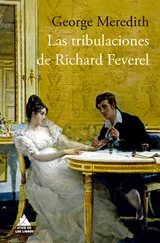George Meredith - The Ordeal of Richard Feverel. Volume 1
Здесь есть возможность читать онлайн «George Meredith - The Ordeal of Richard Feverel. Volume 1» — ознакомительный отрывок электронной книги совершенно бесплатно, а после прочтения отрывка купить полную версию. В некоторых случаях можно слушать аудио, скачать через торрент в формате fb2 и присутствует краткое содержание. Жанр: foreign_prose, literature_19, foreign_antique, на английском языке. Описание произведения, (предисловие) а так же отзывы посетителей доступны на портале библиотеки ЛибКат.
- Название:The Ordeal of Richard Feverel. Volume 1
- Автор:
- Жанр:
- Год:неизвестен
- ISBN:нет данных
- Рейтинг книги:3 / 5. Голосов: 1
-
Избранное:Добавить в избранное
- Отзывы:
-
Ваша оценка:
- 60
- 1
- 2
- 3
- 4
- 5
The Ordeal of Richard Feverel. Volume 1: краткое содержание, описание и аннотация
Предлагаем к чтению аннотацию, описание, краткое содержание или предисловие (зависит от того, что написал сам автор книги «The Ordeal of Richard Feverel. Volume 1»). Если вы не нашли необходимую информацию о книге — напишите в комментариях, мы постараемся отыскать её.
The Ordeal of Richard Feverel. Volume 1 — читать онлайн ознакомительный отрывок
Ниже представлен текст книги, разбитый по страницам. Система сохранения места последней прочитанной страницы, позволяет с удобством читать онлайн бесплатно книгу «The Ordeal of Richard Feverel. Volume 1», без необходимости каждый раз заново искать на чём Вы остановились. Поставьте закладку, и сможете в любой момент перейти на страницу, на которой закончили чтение.
Интервал:
Закладка:
George Meredith
The Ordeal of Richard Feverel – Volume 1
CHAPTER I
Some years ago a book was published under the title of "The Pilgrim's Scrip." It consisted of a selection of original aphorisms by an anonymous gentleman, who in this bashful manner gave a bruised heart to the world.
He made no pretension to novelty. "Our new thoughts have thrilled dead bosoms," he wrote; by which avowal it may be seen that youth had manifestly gone from him, since he had ceased to be jealous of the ancients. There was a half-sigh floating through his pages for those days of intellectual coxcombry, when ideas come to us affecting the embraces of virgins, and swear to us they are ours alone, and no one else have they ever visited: and we believe them.
For an example of his ideas of the sex he said:
"I expect that Woman will be the last thing civilized by Man."
Some excitement was produced in the bosoms of ladies by so monstrous a scorn of them.
One adventurous person betook herself to the Heralds' College, and there ascertained that a Griffin between two Wheatsheaves, which stood on the title-page of the book, formed the crest of Sir Austin Absworthy Bearne Feverel, Baronet, of Raynham Abbey, in a certain Western county folding Thames: a man of wealth and honour, and a somewhat lamentable history.
The outline of the baronet's story was by no means new. He had a wife, and he had a friend. His marriage was for love; his wife was a beauty; his friend was a sort of poet. His wife had his whole heart, and his friend all his confidence. When he selected Denzil Somers from among his college chums, it was not on account of any similarity of disposition between them, but from his intense worship of genius, which made him overlook the absence of principle in his associate for the sake of such brilliant promise. Denzil had a small patrimony to lead off with, and that he dissipated before he left college; thenceforth he was dependent upon his admirer, with whom he lived, filling a nominal post of bailiff to the estates, and launching forth verse of some satiric and sentimental quality; for being inclined to vice, and occasionally, and in a quiet way, practising it, he was of course a sentimentalist and a satirist, entitled to lash the Age and complain of human nature. His earlier poems, published under the pseudonym of Diaper Sandoe, were so pure and bloodless in their love passages, and at the same time so biting in their moral tone, that his reputation was great among the virtuous, who form the larger portion of the English book-buying public. Election-seasons called him to ballad-poetry on behalf of the Tory party. Dialer possessed undoubted fluency, but did tittle, though Sir Austin was ever expecting much of him.
A languishing, inexperienced woman, whose husband in mental and in moral stature is more than the ordinary height above her, and who, now that her first romantic admiration of his lofty bearing has worn off, and her fretful little refinements of taste and sentiment are not instinctively responded to, is thrown into no wholesome household collision with a fluent man, fluent in prose and rhyme. Lady Feverel, when she first entered on her duties at Raynham, was jealous of her husband's friend. By degrees she tolerated him. In time he touched his guitar in her chamber, and they played Rizzio and Mary together.
"For I am not the first who found
The name of Mary fatal!"
says a subsequent sentimental alliterative love-poem of Diaper's.
Such was the outline of the story. But the baronet could fill it up. He had opened his soul to these two. He had been noble Love to the one, and to the other perfect Friendship. He had bid them be brother and sister whom he loved, and live a Golden Age with him at Raynham. In fact, he had been prodigal of the excellences of his nature, which it is not good to be, and, like Timon, he became bankrupt, and fell upon bitterness.
The faithless lady was of no particular family; an orphan daughter of an admiral who educated her on his half-pay, and her conduct struck but at the man whose name she bore.
After five years of marriage, and twelve of friendship, Sir Austin was left to his loneliness with nothing to ease his heart of love upon save a little baby boy in a cradle. He forgave the man: he put him aside as poor for his wrath. The woman he could not forgive; she had sinned every way. Simple ingratitude to a benefactor was a pardonable transgression, for he was not one to recount and crush the culprit under the heap of his good deeds. But her he had raised to be his equal, and he judged her as his equal. She had blackened the world's fair aspect for him.
In the presence of that world, so different to him now, he preserved his wonted demeanor, and made his features a flexible mask. Mrs. Doria Forey, his widowed sister, said that Austin might have retired from his Parliamentary career for a time, and given up gaieties and that kind of thing; her opinion, founded on observation of him in public and private, was, that the light thing who had taken flight was but a feather on her brother's Feverel-heart, and his ordinary course of life would be resumed. There are times when common men cannot bear the weight of just so much. Hippias Feverel, one of his brothers, thought him immensely improved by his misfortune, if the loss of such a person could be so designated; and seeing that Hippias received in consequence free quarters at Raynham, and possession of the wing of the Abbey she had inhabited, it is profitable to know his thoughts. If the baronet had given two or three blazing dinners in the great hall he would have deceived people generally, as he did his relatives and intimates. He was too sick for that: fit only for passive acting.
The nursemaid waking in the night beheld a solitary figure darkening a lamp above her little sleeping charge, and became so used to the sight as never to wake with a start. One night she was strangely aroused by a sound of sobbing. The baronet stood beside the cot in his long black cloak and travelling cap. His fingers shaded a lamp, and reddened against the fitful darkness that ever and anon went leaping up the wall. She could hardly believe her senses to see the austere gentleman, dead silent, dropping tear upon tear before her eyes. She lay stone-still in a trance of terror and mournfulness, mechanically counting the tears as they fell, one by one. The hidden face, the fall and flash of those heavy drops in the light of the lamp he held, the upright, awful figure, agitated at regular intervals like a piece of clockwork by the low murderous catch of his breath: it was so piteous to her poor human nature that her heart began wildly palpitating. Involuntarily the poor girl cried out to him, "Oh, sir!" and fell a-weeping. Sir Austin turned the lamp on her pillow, and harshly bade her go to sleep, striding from the room forthwith. He dismissed her with a purse the next day.
Once, when he was seven years old, the little fellow woke up at night to see a lady bending over him. He talked of this the neat day, but it was treated as a dream; until in the course of the day his uncle Algernon was driven home from Lobourne cricket-ground with a broken leg. Then it was recollected that there was a family ghost; and, though no member of the family believed in the ghost, none would have given up a circumstance that testified to its existence; for to possess a ghost is a distinction above titles.
Algernon Feverel lost his leg, and ceased to be a gentleman in the Guards. Of the other uncles of young Richard, Cuthbert, the sailor, perished in a spirited boat expedition against a slaving negro chief up the Niger. Some of the gallant lieutenant's trophies of war decorated the little boy's play-shed at Raynham, and he bequeathed his sword to Richard, whose hero he was. The diplomatist and beau, Vivian, ended his flutterings from flower to flower by making an improper marriage, as is the fate of many a beau, and was struck out of the list of visitors. Algernon generally occupied the baronet's disused town-house, a wretched being, dividing his time between horse and card exercise: possessed, it was said, of the absurd notion that a man who has lost his balance by losing his leg may regain it by sticking to the bottle. At least, whenever he and his brother Hippias got together, they never failed to try whether one leg, or two, stood the bottle best. Much of a puritan as Sir Austin was in his habits, he was too good a host, and too thorough a gentleman, to impose them upon his guests. The brothers, and other relatives, might do as they would while they did not disgrace the name, and then it was final: they must depart to behold his countenance no more.
Читать дальшеИнтервал:
Закладка:
Похожие книги на «The Ordeal of Richard Feverel. Volume 1»
Представляем Вашему вниманию похожие книги на «The Ordeal of Richard Feverel. Volume 1» списком для выбора. Мы отобрали схожую по названию и смыслу литературу в надежде предоставить читателям больше вариантов отыскать новые, интересные, ещё непрочитанные произведения.
Обсуждение, отзывы о книге «The Ordeal of Richard Feverel. Volume 1» и просто собственные мнения читателей. Оставьте ваши комментарии, напишите, что Вы думаете о произведении, его смысле или главных героях. Укажите что конкретно понравилось, а что нет, и почему Вы так считаете.












